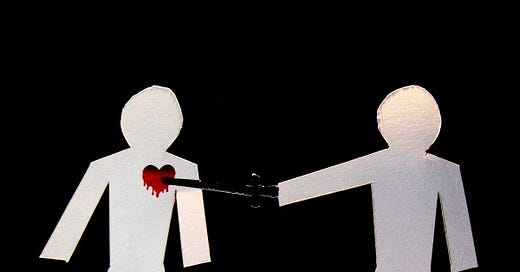Our Drug of Choice is Feeling Betrayed: Taylor Swift, the Dodgers, and all the Others who Let us Down
We are a people addicted to betrayal.
To be more precise, we are a people addicted to expressing outrage at the myriad ways in which individuals and institutions let us down.
Masses of young Taylor Swift fans declare they are furious and heartbroken. Why? Their heroine has started dating one Matty Healy, a pop star whose public pronouncements are “problematic.” (If there’s an adjective I’d like to see erased from the discourse, “problematic”would be high on my list. There are very few words that engender an instant internal eyeroll. “Bespoke,” “curated,” and “granular” are three others of which I have grown tired.) Taylor has betrayed her earnest young fans, who suffer from the certainty that they are obligated to call out their idol when her private life seems to diverge from her public pronouncements.
This same week, certain evangelicals were horrified to discover that some of the cast and crew of The Chosen (a streaming series dedicated to the life of Jesus of Nazareth) are also supporters of gay and lesbian rights. Someone leaked a set photo that showed a Pride flag propped up on the cinematographer’s camera rig. While some fans of the show (whose fanbase is nearly as devoted as Miss Swift’s) said that it didn’t bother them, others howled in betrayal, and called for a boycott.
Here in the angel town, the Dodgers recently disinvited – then reinvited – the Sisters of Perpetual Indulgence to appear at the team’s Pride Night. The Sisters do good work, but also mock Catholics, particularly those in holy orders. When the Sisters were disinvited, elements of the LGBTQ community shrieked in anger; when the Sisters were clumsily reinvited, many conservatives announced that they were heartbroken. Everyone on all sides took the opportunity to declare that either the Disinvite or the Reinvite constituted a profoundly upsetting betrayal.
Everyone and their cousin Bob feel betrayed by something some leader or agency did during COVID. One group of friends thinks the government betrayed the American people by reopening too soon, dropping all anti-infection measures, and rushing back to normal. Another group declare that they feel equally betrayed by a government that closed businesses, shuttered schools, and enforced onerous mandates. The emotions are identical, and each side tells the exact same origin story:
Before COVID, I had trust in the state. I had faith in the CDC. I believed the government would act in our best interest. Now, I see that our public institutions are run by dangerously malevolent forces who care nothing for me or my family! I have no trust in anything anymore! I’ve lost relationships with people who can’t see the truth! Betrayal has woken me up, and now I can never go back to my former innocence! I shall tweet in my pain, and you will listen, or you are dead to me, traitor!
Taylor Swift’s love life doesn’t merit quite as much attention as COVID policy, one supposes, but the through line of outrage is unmistakable.
Another story my American readers probably missed this past week: Philip Schofield, the very popular host of Britain’s top-rated morning TV show, has resigned in disgrace. He cheated on his wife, with a much younger colleague. This being 2023, he had to go at once, but of course, you guessed it – countless folks online declare that they feel personally betrayed that this beloved presenter had an extramarital affair.
Holly is not Phil’s wife. But good news! It doesn’t matter. We all get to be betrayed.
I mention my own past far too often, but this is relevant. My fall from grace was very public. Not quite Taylor Swift or the Dodgers level of public, but the scandal that ended my career made the Daily Beast, the Daily Mail, the New York Daily News, and my hometown papers. Some of my former students and colleagues declared that they felt betrayed. They had every right to feel that way. But some went further: one colleague of mine, who was also friends with my then-wife, called Eira and said, “I know you’re hurting, but I think you should know that everyone at PCC also feels equally betrayed by what Hugo did.”
Equally.
Eira was enduring a very public disgrace. She was worried the father of her babies might kill himself. She was dealing with the very sudden loss of her husband’s teaching and public speaking income. (In a drugged state, I had negotiated away any severance package.) She was looking at single motherhood and being thrown into poverty, but someone thought it helpful to remind her that oodles of other people were also betrayed by what I had done. Eira told me this story years later. “I was kinder to your ex-colleague than I should have been. I was just so flabbergasted that people could compare their indignation to my devastation.”
Indeed. But to the modern online mind, that claim of feeling “equally betrayed” isn’t grotesque and hyperbolic, it’s entirely justified. We are all connected so intimately, right, that a wound to one is a wound to all?
Betrayal is also a flattering and useful origin story. It shows up in the standard stump speech for half our politicians: Oh, my friends, I was young and foolish, and I trusted once too. Then came the Iraq War, or the 2008 bailouts, or Fauci’s gain-of-function experiments, or the little black helicopters, or the rigged voting machines, or the corporate Democrats who destroyed Bernie, and I tell you, my fellow Americans, my eyes were opened! I was shocked, as you are shocked. But we will rise like a phoenix from the ashes of this betrayal! You can’t trust institutions, but you can trust me, and you’ll find the link to my latest book on my website, and I’ll tell you all about how you too can channel your anguish and outrage into a better America, a slimmer waistline, a softer pillow, and prosperity!
If you go around saying, “I’ve always been the suspicious type and I’ve never trusted anyone or anything,” you can’t build a movement or sell a book. You tell your “Once I believed, then I was betrayed” story and you can get your 15 minutes and your HarperCollins advance. Scandal sells, but what really gets the clickies are narratives that detail shattering losses of faith.
There has long been an element in American life susceptible to conspiracy theories. There has long been a human need to identify closely with the famous, and to take their personal failings far too much to heart. The difference is that now, we are privy to a good deal more information than we were in the past, and it comes not as a trickle, but as a firehose. Where once we thought nice things about Mr. Ramirez across the street who always waved and helped us with our trashcans (but whose inner life was a mystery to us), now we know from the Nextdoor page that Mr. Ramirez believes appalling things. How can I live next to this person who flies a Pride flag, or a Blue Lives Matter flag? How can I live next to the person who doesn’t fly those flags, but in his heart has sympathy for these awful people?
Betrayed, in my own neighborhood! I won’t wave at that bigot again.
I’m pretty good at both-sidesing a lot of things. It’s my nature, and it’s a function too of how my damaged brain navigates the world. I respond to tone first, content much later. (Rather like a puppy who will wag his tail when you say “Bad dog” in a cute and loving voice.) So, when I hear anger, or howls of betrayal, I note that they all sound the same, even if the source of the outrage or the hurt may be very different. A raised voice is a raised voice regardless of whether the provocation is rooted in fact or fancy.
At the same time, some betrayals really do happen. Sometimes governments do lie to their people. Sometimes spouses do cheat. Sometimes pop stars say one thing, and then seem to do another. This is not new. Humans do human things and will continue to do human things. Our choice is to consider to what degree our politics and our passions are driven by a sense that we have been lied to. Our choice is to consider whether we want our wounds, our grievances, and our disappointments to be the foundations of our activism. Our choice is to decide whether we want to attribute our individual and collective misfortunes to malice and manipulation, or to the more easily forgivable mixture of incompetence and impulse.
The mother of my children has forgiven me. Eira’s mother, her sister, and her brother have forgiven me. I get along very well with my ex-in-laws. My wife Victoria gets along very well with my ex-in-laws! It’s great fun to see how much the woman to whom I am married gets on with her husband’s ex-brother-in-law. They are thick as thieves together. But – one of Eira’s relatives can’t forgive me. He won’t speak to me and avoids family functions at which I am present. As Eira says, “He is choosing to hold on to a resentment on my behalf, even though I let it go years ago. It is entirely his choice.”
Choosing to remain stuck in betrayal is, in the end, a choice.
I do not take for granted the forgiveness I have been extended. I do not minimize betrayals, both private and political. I also know that to go through our lives animated by outrage and hurt is personally and collectively immiserating. We cannot have families if we cannot forgive betrayals, and we cannot have a public life together as Americans if our primary political emotion is outrage. That’s not my “kumbaya both-sidesism” talking – that’s basic history and basic psychology.
Can you have a public life without grievance and outrage? Do you imagine that your side will, in the short term, vanquish the other so thoroughly that they repent of all that they have done and submit meekly to your prescription for our common life? Or do you plan on bequeathing to your children a legacy of betrayal, so that they grow up like the Irish fanatics of the Yeats poem, “maimed from the start?”
I choose to ask for forgiveness a lot, extend forgiveness reflexively, and avoid – as much as humanly possible – looking for injury. I know that I could probably make some money by getting on the Outrage Circuit, and hey, I’m not averse to ghostwriting for someone who is, but as for me and my house, we will choose a more genial and trusting path.





Love this!! And love to see the roll you are on with your writing!! Fight On!!